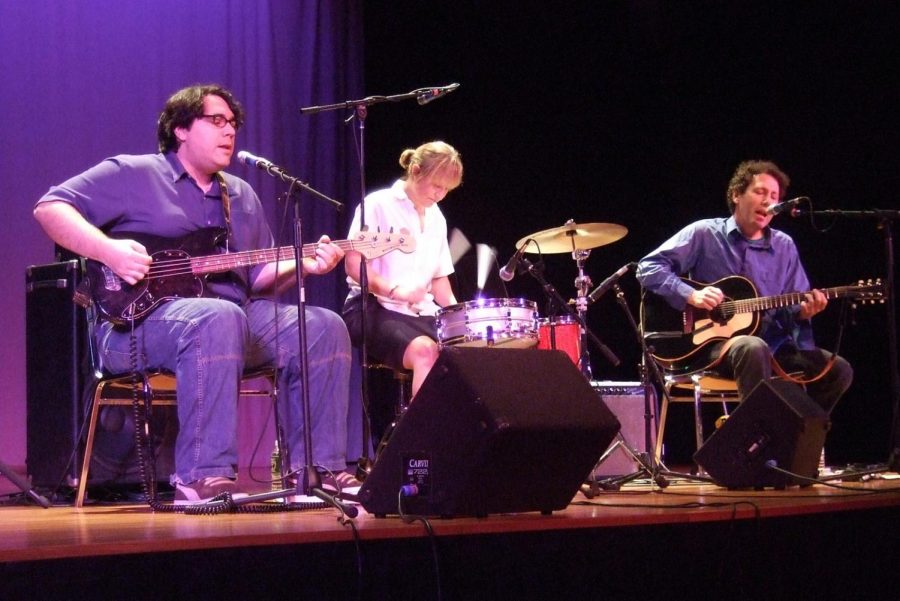Yo La Tengo’s ‘This Stupid World’ confuses listeners through its musical diversity
Released on February 10 of this year, Yo La Tengo’s ‘This Stupid World’ marks the band’s 17th studio album and introduces a dark and ominous sound to the band’s experimental music style. Recorded and produced during the pandemic, the album’s sound reflects the widespread lonely and empty mood of 2020 quarantine, sometimes effectively and sometimes not.
The album commences with an overly powerful track, titled ‘Sinatra Drive Breakdown,’ which begins with a lengthy electric guitar intro and later introduces a drum beat and various strange sounds to evoke emotions of fear, contributing to the ominous mood. Although this instrumentation is effective in establishing this ominous preface, it is excessive and makes the listener unnerved, which deters them from not only the song but the entire album immediately. Moreover, the song is extremely long and features too many instruments blaring together simultaneously that it becomes simply painful to listen to.
The second song, ‘Fallout’ is far less aggressive than the previous one and relies more heavily on vocals/harmony than excessive instrumentation, making it a more appealing listen. Along with this, the song features some meaningful lyrics, such as “Everyday it hurts to look, I’d turn away if only I could,” which reflects the inevitable desperation in missing someone and refusing to let go, connecting emotionally with listeners.
Track 3, titled ‘Tonight’s Episode’ transitions into an even softer melody than the previous song, featuring an acoustic intro, very low vocals, and an echo of certain verses, creating a soulful and peaceful sound. Moreover, the song conveys an inspirational message, such as through the lyrics “Sure the sun is in my eyes, but I feel fine,” and “Don’t bring me down with your advice, I’ve got my own plan,” which encourages independence and perseverance through figurative language and an imperative sentence.
The dreamy and serene sound continues into the next track, ‘Aselestine,’ which is characterized by dreamy and acoustic instrumentation, featuring soft electric guitar riffs, and accompanies by a soft, high voice further contributing to the dreamy sound. Despite the sound, the song’s lyrics take a darker turn as they discuss drug addiction, as seen through lyrics such as “The drugs don’t do what they said they’d do.” In this way, the song successfully employs contrast to shock the audience and ensure they will remember the song and its message.
The next two songs, ‘Until It Happens’ and ‘Apology Letter’ abide to a similar dreamy and soft sound with darker and sadder lyrics, establishing a tone of melancholy or romanticized loneliness. For example, the song ‘Apology Letter’ describes a person tainted by guilt, struggling to find the right words to say to apologize to a person they had wronged. The earnest and desperate lyrics are effective in connecting emotionally with the audience and outlining a relatable experience, thus marking another memorable listen.
The tranquil and ethereal sounds continue with the intro of ‘Brain Capers’, which begins with a soft drum mimicking a heartbeat, but suddenly switches drastically to a harder rock sound, introducing various instruments at once and strange growling sounds. While the song is symbolic in reflecting the volatility and “capers” of our brains and emotions, the song is not an enjoyable listen as the lyrics are incohesive and the sounds are far too chaotic and overwhelming for listeners.
The album concludes on a bleak note with ‘This Stupid World’ and ‘Miles Away,’ both of which are excessively long amalgamations of strange sounds, such as whirring machines and lawn mowers along with experimental instrumentation. The conclusion of the album gradually drifts into a quiet, empty, and ominous sound, reflecting the loneliness and desolation after being drained by the world and its events. While this message is meaningful, the songs are far too long, boring the audience while mildly scaring them with the unidentifiable sounds.
Overall, this album had some triumphs, such as middle section which relied on softer sounds and more emphasis on lyrics, marking an enjoyable and memorable listen. While Yo La Tengo has demonstrated a similar experimental style throughout their albums, their album ‘I Can Hear The Heart Beating As One’ relies entirely on softer sounds and is wholly an enjoyable listen.
I feel this album deserves a 5/10 rating, as despite its triumphs, its beginning and ending were dissatisfactory and drew me away from the album as a listener.






